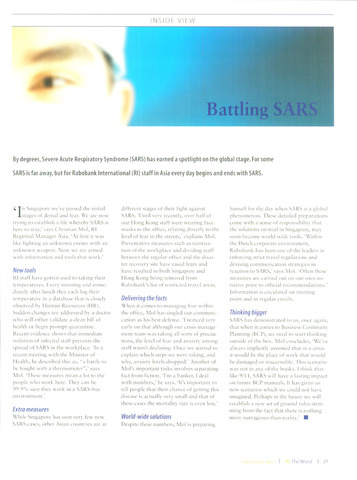Battling SARS
INSIDE VIEW
By degrees, Severe Acute Respiratory Syndrome (SARS) has earned a spotlight on the global stage. For some
SARS is far away, but for Rabobank International (Rl) staff in Asia every day begins and ends with SARS.
New tools
Extra measures
Delivering the facts
World-wide solutions
Thinking bigger
C Tn Singapore we've passed the initial
J-stages of denial and fear. We are now
trying to establish a life whereby SARS is
here to stay,' says Christian Mol, Rl
Regional Manager Asia. 'At first it was
like fighting an unknown enemy with an
unknown weapon. Now we are armed
with information and tools that work.'
RI staff have gotten used to taking their
temperatures. Every morning and imme-
diately after lunch they each log their
temperature in a database that is closely
observed by Human Resources (HR).
Sudden changes are addressed by a doctor
who will either validate a clean bill of
health or begin prompt quarantine.
Recent evidence shows that immediate
isolation of infected staff prevents the
spread of SARS in the workplace. 'In a
recent meeting with the Minister of
Health, he described this as, "a battle to
be fought with a thermometer",' says
Mol. 'These measures mean a lot to the
people who work here. They can be
99.9% sure they work in a SARS-free
environment.'
While Singapore has seen very few new
SARS cases, other Asian countries are at
different stages of their fight against
SARS. 'Until very recently, over half of
our Hong Kong staff were wearing face-
masks in the office, relating directly to the
level of fear in the streets,' explains Mol.
Preventative measures such as sanitiza-
tion of the workplace and dividing staff
between the regular office and the disas
ter recovery site have eased fears and
have resulted in both Singapore and
Hong Kong being removed from
Rabobank's list of restricted travel areas.
When it comes to managing fear within
the office, Mol has singled out communi-
cation as his best defense. 'I noticed very
early on that although our crisis manage
ment team was taking all sorts of precau-
tions, the level of fear and anxiety among
staff wasn't declining. Once we started to
explain which steps we were taking, and
why, anxiety levels dropped.' Another of
Mol's important tasks involves separating
fact from fiction. 'I'm a banker, I deal
with numbers,' he says. 'It's important to
teil people that their chance of getting this
disease is actually very small and that of
these cases the mortality rate is even less.'
Despite these numbers, Mol is preparing
himself for the day when SARS is a global
phenontenon. These detailed preparations
come with a sense of responsibility that
the solutions on trial in Singapore, may
soon becorne world-wide tools. 'Within
the Dutch corporate environment,
Rabobank has been one of the leaders in
enforcing strict travel regulations and
devising communieation strategies in
reaction to SARS,' says Mol. 'Often these
measures are carried out on our own ini-
tiative prior to official recommendations.'
Information is circulated on meeting
point and in regular emails.
SARS has demonstrated to us, once again,
that when it comes to Business Continuity
Planning (BCP), we need to start thinking
outside of the box. Mol concludes, 'We've
always implicitly assumed that in a crisis
it would be the place of work that would
be damaged or inaccessible. This scenario
was not in any of the books. I think that
like 9/11, SARS will have a lasting impact
on future BCP manuals. It has given us
new scenarios which we could not have
imagined. Perhaps in the future we will
establish a new set of ground rules stem
ming from the fact that there is nothing
more outrageous than reality.'
The Word I 27

